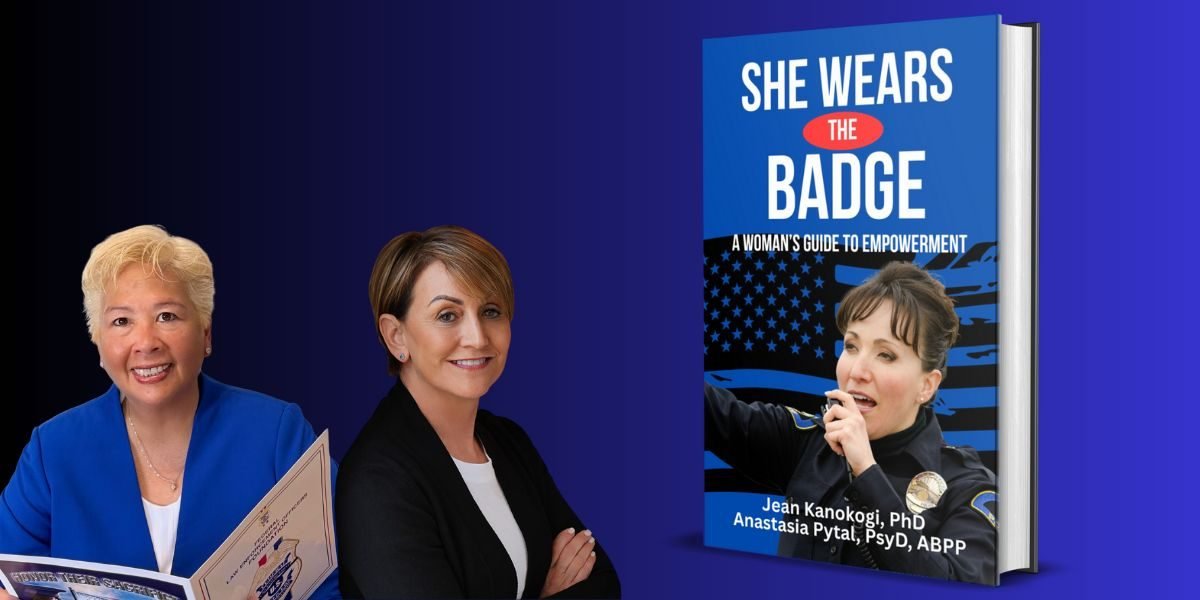In an era when law enforcement is under more scrutiny and pressure than ever before, She Wears the Badge—A Woman’s Guide to Empowerment arrives as a timely and necessary resource, co-authored by Dr. Jean Kanokogi, a retired federal agent and 9/11 first responder, and Dr. Anastasia (Stacy) Pytal, a board-certified police, and public safety psychologist with first-hand experience as a former officer. This book brings together lived experience, clinical expertise, and practical strategies to support women in policing.
With fewer than 13 percent of law enforcement officers in the U.S. being female, the challenges of navigating this profession can feel isolating. Add to that the unique mental health toll of the job, often ignored or stigmatized, and the need for specialized guidance becomes clear. She Wears the Badge addresses that gap directly, offering women in law enforcement a roadmap for resilience, advocacy, and leadership.
A Book Born From the Field
What sets She Wears the Badge apart is its dual-author approach. Dr. Kanokogi draws on over 25 years in federal law enforcement and her experience as a 9/11 responder to reflect on the cost of service and the power of healing. Dr. Pytal brings her perspective as a psychologist treating first responders, a former officer, and a clinical advisor to one of the largest police unions in the U.S.
Both women have seen the profession from inside and out. Their collaboration began during a law enforcement wellness conference in New Mexico. Over dinner, they realized the same stories and scenarios for women in law enforcement kept repeating: women officers struggling with identity, burnout, stigma, and workplace inequality. They decided to write the book they wished they’d had at the start of their careers.
This is not a theoretical manual. It’s grounded in the lived experiences of women in uniform, supported by best practices in law enforcement wellness and trauma recovery.
A Toolkit for Mental Health, Leadership, and Growth
She Wears the Badge isn’t just a reflection of the past; it’s a guide for the future. The book tackles topics including peer support, navigating male-dominated environments, communication versus physical strength, impostor syndrome, trauma exposure, and the unique dynamics of wellness in policing.
One of the most powerful takeaways is the concept of “pre-silience” proactively building resilience before critical incidents happen. Dr. Pytal has long advocated for this mindset in her therapy work with first responders. Her goal is to help officers develop the tools they need to manage trauma before it accumulates into a crisis.
The authors also emphasize that empowerment doesn’t always look like a rank or title. Sometimes it looks like mentoring another woman, speaking up in a room where no one else does, setting boundaries that preserve your mental health, or applying for a promotion even when you don’t feel ready.
Why It Matters Now
The timing of She Wears the Badge is no accident. Law enforcement agencies nationwide are grappling with recruitment, retention, and officer wellness issues. For women, the barriers remain particularly high. Many departments still lack female representation in leadership, and most officers don’t have access to culturally competent mental health support.
The book’s message is simple: women in law enforcement are not alone, and their experiences matter.
Dr. Kanokogi’s personal story underscores that message. As someone who worked at Ground Zero and later survived multiple brain surgeries related to her 9/11 service, she writes with authority on trauma recovery and post-service purposes. Despite physical setbacks, she continues to advocate for national officer wellness legislation and trains departments on how to lead with both strength and compassion.
Dr. Pytal has helped shape peer support policy and has served countless officers through her private practice. Together, they have presented internationally and trained a multitude of departments, from federal agencies to rural units, on resilience, trauma-informed care, and women’s empowerment.

Photo Courtesy: Jean Kanokogi & Anastasia Pytal
Beyond the Book
The impact of She Wears the Badge extends beyond its pages. The authors are actively engaging with law enforcement associations, police academies, and national mental health organizations to integrate the book’s tools into training curricula. Their work supports both women officers and the male leaders who want to better understand the experience of their female counterparts.
They also encourage readers to form local support groups and use the book as a conversation starter. Whether you’re a rookie patrol officer, a command-level leader, or a civilian ally, there’s something in She Wears the Badge that will shift your perspective.
At its core, She Wears the Badge is a movement. It’s about changing the culture of law enforcement from the inside out, by elevating the voices of women, prioritizing officer wellness, and redefining what real leadership looks like.
The authors don’t promise perfection. They offer hope. They share stories from the “school of hard knocks,” not to glorify struggle, but to show what it means to grow through it. Their credibility comes not from position alone, but from service, scars, and a clear purpose.
If you or someone you know is in law enforcement, especially women just starting out, this book is a must-read. Visit www.empoweringwomen50.com or www.drjean007.com to purchase a personalized and signed copy of the book and join a growing community committed to wellness, leadership, and lasting impact. You can also join the movement by purchasing She Wears the Badge—A Woman’s Guide to Empowerment, for you or as a gift on Amazon and Barnes and Noble.
Disclaimer: The content is intended for informational purposes only and should not be considered as professional or medical advice. Always consult with a qualified professional or counselor for personalized guidance and recommendations on mental health, wellness, and career development within law enforcement.









